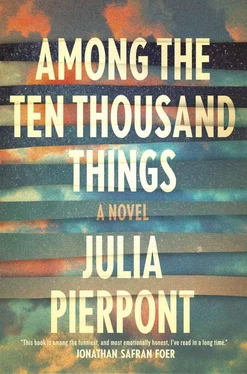“Maybe you could try sending them to somebody,” Ruth said in the kitchen.
“I think that ship sort of sailed.” Simon had gone to a psychiatrist the year before, after what happened at the Best Buy. He’d come home complaining that the lady was half-deaf and smelled of vitamins. She’d told him he could talk about whatever he wanted, so Simon had talked about videogames.
“So they don’t like to talk.” Ruth came out carrying a mug with a thumb rest and a handful of her pills. “Well, they’re definitely yours.”
“What’s that supposed to mean?” Deb asked as Ruth delivered the pills, then the mug, to her mouth, swallowing with a sharp backward kick of her head. “Really, Mom, do you have to take them like that?”
“How am I supposed to take them?”
“Nothing, just it’s dramatic.”
“Deborah.” Ruth put a hand in the air, palm out, where it tremored and failed to make her point. “What is your problem? Say.”
“I don’t know. It seems ridiculous all of a sudden. That I wanted to work it out.”
Ruth sat and leaned her hand with the mug on her daughter’s knee. “What changed?”
“Reading it? I don’t know, believing? And I want Kay to be able to tell me what she’s feeling. I don’t want Simon to think of me as a person who lets these things happen.”
“You want to set an example. But everything’s black and white at their age. Give yourself a break. You’ll make yourself crazy. Not everything is so cut and dry.”
Deb was thinking, why does everybody cry. Stupid to cry; what does it do? What does it get out? “Do you know, I keep thinking of what you told me, when you knew I was pregnant.” She meant the first time, when her mother had tried to talk her out of it. You’re twenty-six, Deborah. I’m old enough. He’s a married man. I don’t care. What about dancing? Dancing is who cares. Dancing over.
“What did I say?”
“You said, ‘What do you want a child for? You will never again know when it is safe to feel happy.’ ”
“Sure,” Ruth nodded her small blond head. “Like having your heart walk around outside your body the rest of your life.” She stood and walked back to the kitchen. “Am I wrong?”
“No.”
“I can’t hear.”
“No, you’re right,” Deb said louder.
The refrigerator opened, tinkling bottles and jars inside. “So what about tonight? Are you going or what?”
The kids would not come. They’d missed Jack’s shows before, been kept away from them because of content, things she didn’t want their young eyes seeing — nakedness, the suggestion of blood. So there had been a precedent for that. Ruth would call them around six to check in, see if they needed anything. And Deb would be home by eight.
Of course, she had thought about not going herself. But she wasn’t going for him. She was going because she thought the girl might.
—
In the lobby of the gallery, people were starting to gather, bodies in black or white. Plastic cups of wine hovered, deep cherry and blond, catching the light. The warmer days were taking everyone by surprise, and the AC was not quite strong enough, so that the show cards were fanned and fluttered, made to produce small currents. The receptionist girl was there by the door, her hair slicked back with dark grooves, bite marks from a comb’s teeth, the furrows deep and clean and even. Here, too, was art.
Jack mingled.
“I thought the show was called Bait, ” said the woman from KIOSK, “like with an i. ” They all said the same things. Jack laughed and touched their elbows, if they were women, refreshed their drinks if they were men. He laughed and looked to the door and continued to not see her.
—
Deb pulled out her phone, checked the time. Walking was taking longer than she thought it would, but she was in no hurry. Let him wonder. She knew how he got, wired, before an opening. So in a small way she was surprised, how this time he had gone through it alone, that he had not even tried to enlist her. Though if he had —she imagined the things she would have said to him, if he’d come to her now with that worry. Sorry, buddy. Not my problemo. You should have thought about that before. She would have especially liked that part, saying that.
—
“Hate to tell you this,” Stanley said. “I know Deb’s running late, but we gotta open up.” Stanley had been director at the gallery for more years than Jack had known him, and Jack had known him a long time. They stood shoulder to shoulder, facing out, Stanley’s eyes running inventory of who had come, how long the most important people had been waiting.
“Oh, yeah,” Jack answered. “Sure, that’s fine,” and turned toward the room.
For the first eight or nine minutes, only Jack would remember, the show was well received. Bayt was a home in no specified country. It could have been an Israeli home or a Palestinian home. It could have been in Iraq. It took people longer to realize that it could have been in America, too. The books flung from the upended bookcase were blank, and the art knocked from the walls, photographs of fields that Jack had taken years ago in Houston, were of no discernible nationality. The house was filled with things that could have come from anywhere. The target was from no place and every place, and so the enemy too.
When people saw the house they became reverential, as though something really had happened there. Heads poked through the broken windows and holes in the walls. The bolder ones began to climb through the larger opening, exploring. Let them. Others followed. They looked for clues in the way the teacups were painted. Let them.
Jack was by the door when the last explosive went off toward the back of the room, a large bang. A woman screamed. He thought at first that something had been knocked over. Then he saw the smoke and heard another scream, and people were leaving the house, trying not to run, or else they were gathering around one woman, who held her arm strangely. Stanley motioned to security. People were ushered out. An ambulance was called and the woman, five or eight years older than Jack with hair she’d let mostly gray, sat on the ground, clutching her arm and crying.
Jack went over to her, asking, “What was it?” The receptionist teetered in with a box of first aid. “What did you do ?”
The woman just cried. “It doesn’t matter, Jack,” Stanley said. He had one arm around the woman’s shoulders.
It didn’t matter either when Jack said that he’d realized the problem, that it was with block #3, the bit that had not blown all away. It didn’t matter when he said he was sure that explosion was the last one, that all the others had gone off and that it was safe now for everyone to come back. None of that mattered, except to him.
—
The gallery was far west, near the river, but Deb was a whole avenue away when the first show cards began dotting the street like bread crumbs. She took one, catching the corner with her nail, and walked with it, big block letters, BAYT, bobbing in view. In smaller print, the Hebrew and the Arabic, and below those the English: House.
A police car pulled past her, no siren but lights revolving red and blue, which looked less threatening, candy colored, in the still-daylight.
The police stopped just before a small crowd. There was an ambulance too, its rear doors swung open and an old woman sitting in back.
Stanley was near the entrance, talking to an officer. He gesticulated, his hands cupping a small, round space and springing outward, fingers wide.
Through the lobby and its people, some she knew who called to her. The doors were propped open, and she smelled smoke faintly, the beginning or tail end of it. One of Stanley’s assistants put a hand out to stop her. “I’m married to the artist,” she said, and the girl let her pass, but Deb had heard herself too, the strange claim she had on this other person that let her go places, that demanded she did. It had brought her into a room marked off with caution tape, and there was Jack, his arms wrapped around himself like a boy in a fit, the position so at odds with the size of him, the large man he was. “Larger than life,” he used to say, collapsing on top of her, pinning her to the bed.
Читать дальше












